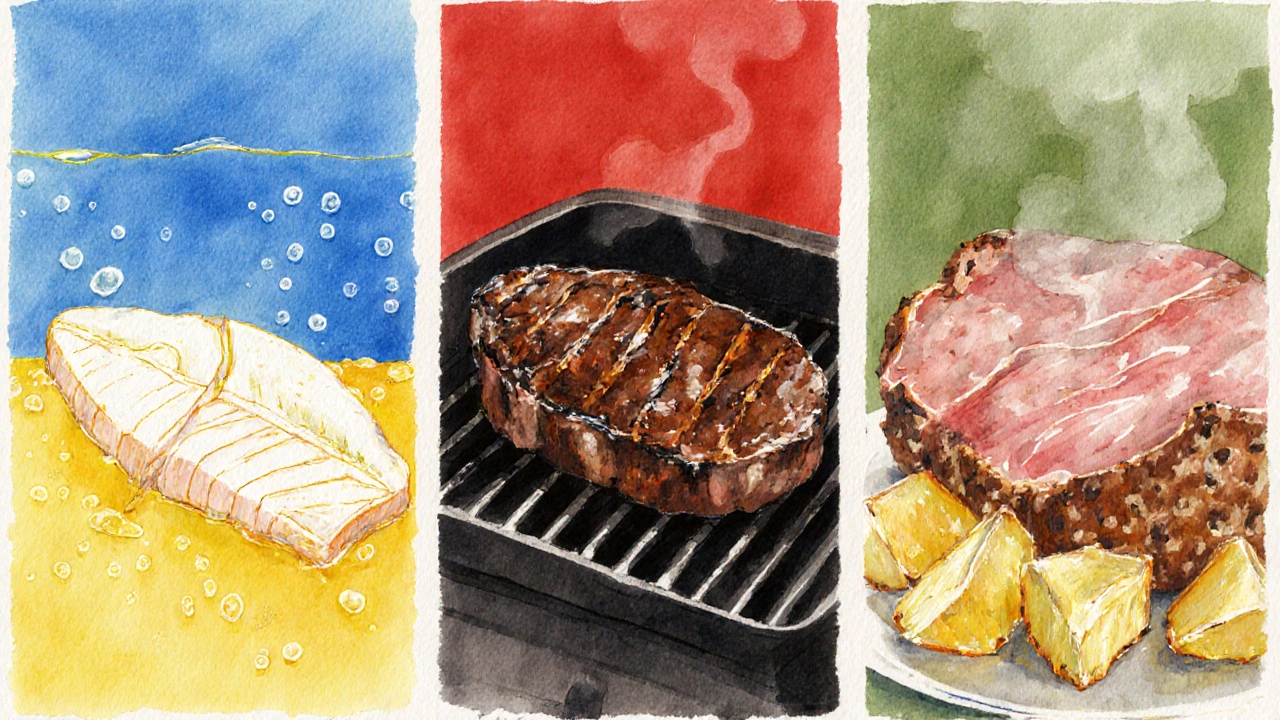Marinade Ingredient Checker
Ingredient Guidelines
Acid
Safe: Short-time (≤30 min) for fish; diluted with oil
Avoid: Long-time (>2 hr) for delicate proteins
Sugar
Safe: Added in the last 5 min of high-heat cooking
Avoid: Full-time on grill or broiler
Salt/Soy Sauce
Safe: As primary seasoning, no extra salt
Avoid: Combined with additional salt
Enzyme-rich Fruit
Safe: Cooked puree or < 5 min raw contact
Avoid: Long-time raw exposure
Dairy
Safe: Refrigerated, ≤8 hr for poultry
Avoid: Room temperature >2 hr
Alcohol
Safe: Refrigerated, ≤24 hr
Avoid: Warm ambient conditions
Oil
Safe: Balanced 1:2 oil-to-acid ratio, emulsified
Avoid: Heavy oil with high acid, no emulsifier
Re-used Marinade
Safe: Boiled for ≥5 min
Avoid: Used directly after raw contact
When it comes to marinating, a few common culprits can turn a tasty dish into a texture nightmare or even a health risk. Below we break down the key ingredients and practices you should steer clear of, why they cause problems, and how to substitute smarter choices.
TL;DR
- Avoid high‑acid mixes for long‑time marinades - they mush meat.
- Skip sugary sauces in hot‑price cooking - they burn fast.
- Don’t over‑salt or use salty sauces alone - they draw out moisture.
- Leave out raw pineapple or papaya in short‑time marinades - enzymes can make proteins mushy.
- Keep dairy, alcohol, and oil from sitting too long at room temperature - they spoil quickly.
Understanding the Core Elements of a Marinade
Before diving into what to avoid, it helps to know the building blocks of a typical marinade. Each component plays a role in flavor, tenderness, or moisture retention.
Marinade is a liquid mixture of acids, salts, sugars, oils, herbs, and sometimes enzymes that infuses food with flavor and can affect texture.
Acid refers to ingredients like lemon juice, vinegar, or yogurt that lower pH and help break down muscle fibers.
Salt draws moisture out of food through osmosis, enhancing flavor and helping the surface retain a crust.
Sugar contributes sweetness and aids browning via the Maillard reaction, but it can also cause rapid scorching.
Enzyme naturally occurring proteins in fruits such as pineapple or papaya that aggressively break down proteins.
Dairy includes yogurt, buttermilk, and kefir, which combine mild acids and fats to tenderize gently.
Oil carries fat‑soluble flavors and keeps the surface from drying out during cooking.
Alcohol such as wine or beer adds flavor and can help dissolve spices, but it evaporates quickly and can become a food‑safety concern if left too long.
Common Pitfalls: What to Keep Out of Your Marinade
Here’s a straight‑forward list of ingredients and practices that most home cooks accidentally misuse.
- Over‑powerful Acids for Long Marinations - Using 100% lemon juice or straight vinegar for more than an hour will turn fish, chicken, or thin cuts of meat into a mushy paste. The acid denatures proteins too aggressively, causing them to lose structure.
- Excess Sugar in High‑Heat Cooking - A glaze heavy on honey, brown sugar, or maple syrup looks delicious, but on a grill or under a broiler the sugars caramelize and burn within minutes, leaving a bitter crust.
- Salty Sauces as the Sole Seasoning - Soy sauce, fish sauce, or miso are salty enough on their own. Adding extra salt on top will draw moisture out, leading to dry, tough meat after cooking.
- Raw Pineapple or Papaya in Short‑Time Marinades - Their bromelain and papain enzymes act like meat tenderizers in minutes. For a 30‑minute steak, a splash of pineapple juice can make the bite slip away, which most diners don’t enjoy.
- Dairy Left at Room Temperature - Yogurt‑based marinades are great for tenderizing, but if they sit out for more than two hours they become breeding grounds for harmful bacteria.
- Alcohol in Warm Environments - While wine adds depth, an open‑air summer barbecue can cause alcohol to evaporate, leaving behind concentrated flavors and a higher chance of spoilage if not refrigerated promptly.
- Too Much Oil in Acidic Mixes - Oil and acid don’t blend well without an emulsifier. A lopsided mixture separates, causing uneven flavor and pockets of raw acid that can over‑tenderize the surface.
- Re‑using Marinade as Sauce - Once it’s touched raw meat, the Marinade can harbor pathogens. Using it directly as a basting sauce without boiling first is a food‑safety misstep.

How to Fix or Avoid These Mistakes
Swap, reduce, or modify the offending ingredient. Below are practical alternatives and timing tips.
- Balance Acid with Fat - Pair 2tablespoons of citrus juice with 1tablespoon of olive oil. This mellows the acid’s impact and keeps proteins from breaking down too fast.
- Control Sugar Levels - Use a 1:1 ratio of sweetener to acidic component (e.g., 1tbsp honey + 1tbsp lime juice). Add the sugar in the last few minutes of grilling to avoid burning.
- Season Smartly - If you use soy sauce, skip the extra salt. Taste the mixture before adding anything else.
- Use Cooked Fruit Purees - Heat pineapple or papaya puree for 2minutes; the heat deactivates the enzymes, letting you enjoy the fruit flavor without mushiness.
- Keep Dairy Cold - Store yogurt or buttermilk marinades in the fridge and limit marinating time to 4hours for poultry, 8hours for tougher cuts.
- Limit Alcohol Exposure - Add wine or beer just before sealing the bag, and keep the marinating container in the refrigerator. Discard after 24hours.
- Emulsify Oil and Acid - Use mustard, honey, or a touch of soy lecithin to bind oil and acid together, ensuring an even coating.
- Boil Re‑used Marinade - If you want to turn leftover Marinade into a sauce, bring it to a rolling boil for at least 5minutes to kill any bacteria.
Quick Reference Checklist
| Ingredient / Practice | Safe Use | When to Avoid |
|---|---|---|
| Acid (lemon, vinegar) | Short‑time (≤30min) for fish; diluted with oil | Long‑time (>2hr) for delicate proteins |
| Sugar (honey, brown sugar) | Added in the last 5min of high‑heat cooking | Full‑time on grill or broiler |
| Salt / Soy sauce | As primary seasoning, no extra salt | Combined with additional salt |
| Enzyme‑rich fruit (pineapple, papaya) | Cooked puree or < 5min raw contact | Long‑time raw exposure |
| Dairy (yogurt, kefir) | Refrigerated, ≤8hr for poultry | Room temperature >2hr |
| Alcohol (wine, beer) | Refrigerated, ≤24hr | Warm ambient conditions |
| Oil | Balanced 1:2 oil‑to‑acid ratio, emulsified | Heavy oil with high acid, no emulsifier |
| Re‑using Marinade as Sauce | Boiled for ≥5min | Used directly after raw contact |
Frequently Asked Questions
Can I marinate chicken overnight with lemon juice?
No. An overnight soak in pure lemon juice will break down the muscle fibers too much, resulting in a mushy texture. Dilute the juice with oil and limit the time to 2-3hours.
Is it safe to reuse a marinade that touched raw meat?
Only if you bring it to a rolling boil for at least five minutes. Boiling destroys harmful bacteria that may have transferred from the raw protein.
What’s the best way to add sweet flavor without burning?
Add honey, maple syrup, or brown sugar during the last few minutes of grilling, or brush it on just before you finish cooking. This limits exposure to high heat.
Do pineapple or papaya work in marinades for pork?
For pork, you can use a tiny amount of fresh pineapple juice (no more than 1tbsp per pound) for a quick 10‑minute boost. Otherwise, cook the fruit first to deactivate the enzymes.
How long can I keep a yogurt‑based marinade in the fridge?
Up to 8hours for chicken and up to 12hours for tougher cuts like beef brisket. Beyond that, the dairy can develop off‑flavors.
Wrapping It Up
Marinating is a simple way to add depth, but the devil is in the details. By avoiding overly acidic, sugary, salty, enzymatic, or improperly stored ingredients, you keep texture pleasant and food safe. Use the checklist, follow the timing tips, and experiment with balanced combos-you’ll see the difference in flavor and mouthfeel without the headaches.
